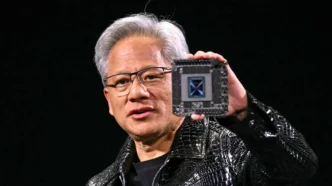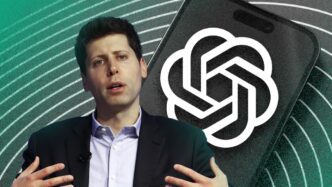Nvidia’s H20 AI chips have managed to dodge looming export restrictions—at least for now—thanks to a behind-the-scenes negotiation between Nvidia CEO Jensen Huang and former U.S. President Donald Trump.
According to NPR, the pivotal moment came during a private dinner at Trump’s Mar-a-Lago estate last week. During the meeting, Huang reportedly pledged to invest in new AI data centers across the U.S., a move that may have persuaded the administration to hold off on imposing new export controls.
Nvidia has declined to comment on the matter, but sources say the deal helped safeguard the H20—currently the most advanced Nvidia chip still allowed for export to China. Although modified to comply with existing U.S. restrictions, the H20 remains a critical tool in the global AI arms race.
Earlier this year, the chip was used by Chinese startup DeepSeek to train its R1 open-source AI model. The model generated buzz in the tech world for rivaling systems built by leading U.S. labs like OpenAI. That performance raised concerns in Washington and triggered calls from both Republican and Democratic senators for stricter controls on H20 chip exports.
The Trump administration itself had reportedly been preparing restrictions before this sudden policy reversal. The shift, while not entirely surprising, highlights a recurring theme in Trump-era policy: using economic incentives and pressure tactics to drive domestic investment in strategic sectors like AI.
Political Pressure and Strategic Investments Shift U.S. AI Policy
This decision to delay restrictions appears to conflict with Trump’s broader goal of maintaining U.S. leadership in AI. Allowing Nvidia to continue selling H20 chips to Chinese companies could inadvertently support China’s rapid AI advancement.
Adding to the contradiction, Trump’s administration has opted to retain the AI export rules first introduced by President Joe Biden earlier this year. These regulations severely limit chip exports not just to China and Russia, but also to several allied nations.
Nvidia has criticized the policy, describing the layered restrictions as “unprecedented and misguided.” The company argues that such barriers will stifle international AI development and curb innovation globally.
Meanwhile, other tech giants are adapting their strategies to align with Trump’s America-first stance. OpenAI recently partnered with SoftBank and Oracle on a $500 billion project to build massive U.S.-based data centers. Microsoft followed suit, pledging $80 billion in AI data infrastructure investments—with half committed to projects inside the U.S.
Trump has not hesitated to use threats to achieve his goals. He allegedly warned Taiwanese semiconductor leader TSMC that it could face up to a 100% tax unless it committed to building chip manufacturing facilities on American soil.
For Nvidia, the temporary win may come at a longer-term cost. The company’s H20 chips remain under intense scrutiny. As AI competition between the U.S. and China escalates, future policy reversals could happen fast.
The bigger question now is whether short-term business wins are worth the long-term geopolitical risks.












